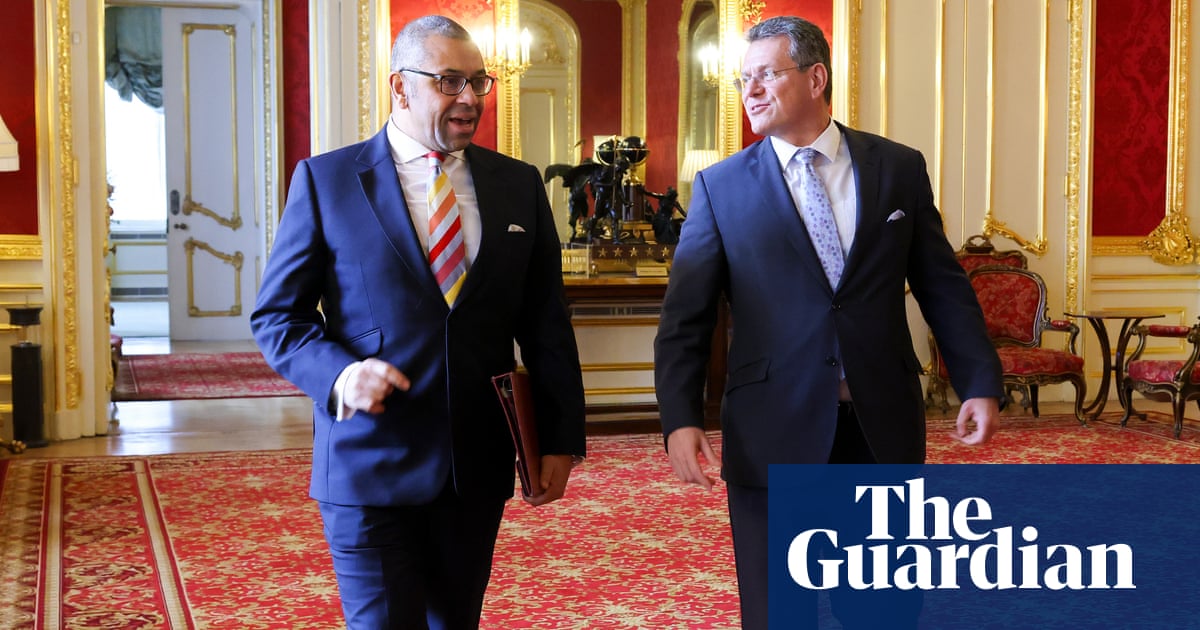
The European Commission has granted the UK a three-month extension on the sale of sausages in Northern Ireland in an attempt to defuse a row that has poisoned post-Brexit relations.
In a widely trailed decision, Brussels said fresh sausages and other chilled meats could continue to move between Great Britain and Northern Ireland until 30 September, giving the two sides more time to resolve a fierce dispute over the Northern Ireland protocol, a centrepiece of the Brexit deal.
While the row centres on chilled sausages and minced meat, it has exposed a fundamental clash over the EU’s fears about protecting its single market and the British government’s wish for undiluted sovereignty, against a backdrop of heightened tensions and street violence in Northern Ireland.
Announcing the decision, the European Commission vice-president, Maroš Šefčovič, said: “Our work is about ensuring that the hard-earned gains of the Good Friday/Belfast agreement – peace and stability in Northern Ireland – are protected, while avoiding a hard border on the island of Ireland and maintaining the integrity of the EU single market. Therefore, we have spared no effort in trying to mitigate some of the challenges that have arisen in the implementation of the protocol.”
To secure his “oven-ready” Brexit deal, Boris Johnson agreed Northern Ireland would remain in the EU customs union and single market, an outcome that his predecessor, Theresa May, said no British prime minister could accept.
The Brexit deal came into force with a six-month delay on the ban on bringing chilled meats into Northern Ireland from Great Britain, to help businesses adjust to the change. The EU does not allow chilled meats into its single market from any non-EU country, a ban the UK government has called “bonkers” when it applies to Great Britain and Northern Ireland. This month the Brexit minister, David Frost, wrote to Brussels requesting a further delay, until 30 September.
The request was granted after the UK agreed not to change domestic law on meat products for the next three months. To assuage EU concerns about British meat illegally entering the EU, products will be labelled “UK only” and sold exclusively in Northern Irish supermarkets.
Lord Frost said on Wednesday: “This is a positive first step but we still need to agree on a permanent solution. Northern Ireland is an integral part of the United Kingdom and its consumers should be able to enjoy products they have bought from Great Britain for years.
“The protocol has to be operated in a pragmatic and proportionate way. The chilled meats issue is only one of a very large number of problems with the way the protocol is currently operating.”
The director of the Northern Ireland Retail Consortium, Aodhán Connolly, said the extension was a “peripheral matter” for trade. “The most pressing issue is the fate of the thousands of food products moving daily from GB to NI, which will be subject to extensive controls when that grace period ends in October,” he said. “We are no closer to a decision by both sides on this.”
This extension may be no more than a truce in the so-called sausage wars. An EU official warned: “We don’t intend to continue with rolling grace periods. So these three months will need to be used wisely.”
The EU continues to press the UK to align its food and plant standards with the bloc, copying the example of Switzerland. A Swiss-style agreement would mean 80% of checks – including those on live animals, fish, meat and dairy products – would disappear, according to the EU. “It could be negotiated very quickly, it can be temporary if the UK’s concern is that it would have an impact on future trade deals,” said the official.
Frost has rejected a Swiss-style agri-food agreement as an “abrogation of sovereignty”. The UK wants both sides to recognise each other’s standards as good enough for checks to be dropped – an approach the EU has long ruled out.
In a related move, the EU has also announced changes to other parts of the protocol, including:
A promise to change EU law to allow the NHS in Northern Ireland to continue to use generic medicines imported via Great Britain. The legal fix will mean regulators in Britain will ensure imported medicines comply with EU safety rules.
Northern Irish motorists will not need to carry an insurance green card when driving into the Republic of Ireland
Guide dogs will be able to move between Great Britain and Northern Ireland without the need for the animal health certificate usually required for pets.
Farm animals moving between Great Britain and Northern Ireland will not need to have ear tags changed multiple times.
EU officials hope the changes will ease tensions between the UK and Brussels, after a rocky six months since the Brexit trade deal was agreed. The latest announcements follow Monday’s long-awaited decision by Brussels to recognise British data protection standards as adequate, allowing digital information to flow freely across the Channel.
But mistrust remains. The EU has not withdrawn a legal case against the UK that it opened when Frost unilaterally extended grace periods on border checks under the protocol.
EU officials also remain unhappy with what they see as the British government’s failure to manage and adequately fund border control posts at Northern Irish ports, a key part of the hard-fought Brexit agreement.












